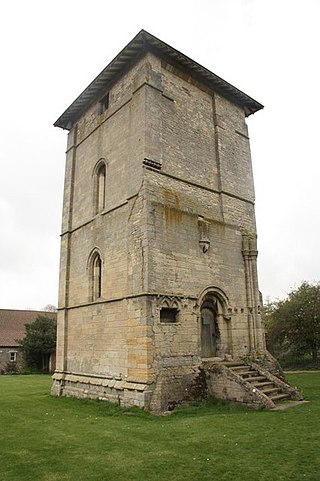
Temple Bruer Preceptory is a historic building in the civil parish of Temple Bruer with Temple High Grange, North Kesteven, Lincolnshire, England. It is one of the few Knights Templar sites left in England where any ruins remain standing. Its name comes from its Templar ownership and its position in the middle of the Lincoln Heath, bruyère (heather) from the French language current at the time. It was founded in the period 1150 to 1160 and the order was dissolved in 1312. The site is located between the A15 and A607 roads, 2.5 miles (4.0 km) north from Cranwell. The site has been excavated twice, firstly by the Rev Dr. G. Oliver, the rector of Scopwick in 1832–3, and in 1908 by Sir William St John Hope.

Byard's Leap is a hamlet in the civil parish of Cranwell, Brauncewell and Byard's Leap, in the North Kesteven district of Lincolnshire, England. It is situated approximately 3 miles (5 km) west from Cranwell. The hamlet is associated with various legends.
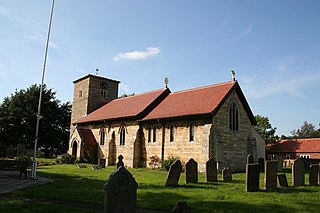
Eagle is a village in the civil parish of Eagle and Swinethorpe, in the North Kesteven district of Lincolnshire, England. It is situated 7 miles (11 km) south-west from Lincoln and 2 miles (3.2 km) east from North Scarle. The population of the civil parish of Eagle and Swinethorpe taken at the 2011 census was 793.
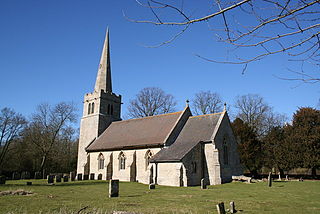
Ashby de la Launde is a small village, part of the civil parish of Ashby de la Launde and Bloxholm, in the North Kesteven district of Lincolnshire, England. The village is situated just west of Digby, and east of the A15 and B1191 roads. In 1921 the parish had a population of 200.
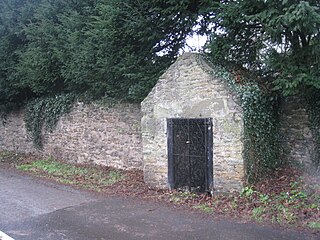
Bottesford Preceptory was sited at Bottesford, just to the south of Scunthorpe, in Lindsey, England. It was on low-lying land, near the Bottesford Beck, about 3 miles (5 km) to the west of the escarpment of the Lincoln Cliff limestone upland, and about the same distance to the east of the River Trent. A preceptory was a community of the Knights Templar who lived on one of that order's estates in the charge of its preceptor. A preceptory also referred to the estate and its buildings. The present Bottesford Manor is believed to have been the gatehouse to the preceptory.

Aslackby Preceptory in Lincolnshire lay to the south-east of Aslackby Church. Until about 1891 a tower, possibly of the preceptory church, together with a vaulted undercroft, survived as part the Temple farmhouse. Temple farmhouse was subsequently rebuilt and a 15th-century window and a stone pinnacle remain in the garden.
Ashby de la Launde and Bloxholm is a civil parish in the North Kesteven district of Lincolnshire, England. According to the 2001 Census it had a population of 796, increasing to 837 at the 2011 census. The parish includes the villages of Ashby de la Launde and Bloxholm, and the southern part of Scopwick Heath. For administrative reasons the parish council is also responsible for the adjacent parish of Temple Bruer with Temple High Grange.

Aslackby and Laughton is a civil parish in the South Kesteven district of Lincolnshire, England. According to the 2001 census the parish had a population of 243, in 102 households. increasing slightly to 251 in 118 households at the 2011 census. It consists of the village of Aslackby, the hamlet of Laughton, and scattered farms, and part of the hamlet of Graby.

South Witham is a village and civil parish in the South Kesteven district of Lincolnshire, England. The population of the civil parish at the 2011 census was 1,533. It is situated 10 miles (16 km) south of Grantham, 10 miles east of Melton Mowbray and 10 miles (16 km) north of Oakham. The village is close to the Leicestershire and Rutland borders.
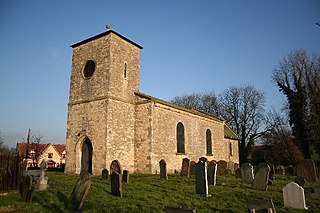
Willoughton is a village and civil parish in the West Lindsey district of Lincolnshire, England. It is situated 2 miles (3.2 km) west from the A15 road, 13 miles (21 km) north from Lincoln and 3 miles (5 km) south from Kirton Lindsey. According to the 2001 Census the village had a population of 330, increasing to 341 at the 2011 census.
Great Limber Preceptory, Limber Magna was a Camera (farm) of the Knights Templar and later the Knights Hospitaller in the village of Great Limber, Lincolnshire, England.
Horkstow Camera was a monastic cell in Lincolnshire, England, dependent on Willoughton Preceptory, a house of the Knights Templar.

Willoughton Preceptory was a holding of the Knights Templar in Lincolnshire, England. The preceptory stood at the farm, still called Temple Garth.

Horkstow is a village and civil parish in North Lincolnshire, England, 4 miles (6.4 km) south-west from Barton-upon-Humber, 1 mile (1.6 km) south from South Ferriby and 9 miles (14.5 km) north from Brigg. It lies on the B1204, and 1 mile (1.6 km) east from the navigable River Ancholme. It is one of the five "Low Villages" – Worlaby, Bonby, Saxby All Saints, Horkstow and South Ferriby – between Brigg and the Humber estuary, so-called because of their position below the northern edge of the Lincolnshire Wolds. Horkstow was previously part of Glanford administrative district, and before that, the North Lindsey division of Lindsey, Lincolnshire.

Great Limber is a village and civil parish in the West Lindsey district of Lincolnshire, England. The population of the civil parish at the 2011 census was 271. It is on the A18, 8 miles (13 km) west from Grimsby and 8 miles east from Brigg.

Withham Preceptory, one of the smallest Knights Templar preceptories in England, was founded, before 1164, at Temple Hill, near South Witham, Lincolnshire, and was abandoned in the early 14th century. The site of the former preceptory at Temple Hill, South Witham. It 'has been largely under pasture' since the Knights Templar left in 1308.

St James the Great Church is a Grade I listed Church of England parish church dedicated to James, son of Zebedee in Aslackby, Lincolnshire, England. The church is 7 miles (11 km) north from Bourne, and in the Aslackby and Laughton parish on the eastern edge the South Kesteven Lincolnshire Vales.
Temple Bruer with Temple High Grange is a civil parish and a former extra-parochial area in North Kesteven, Lincolnshire, England which had in the Medieval period been held by the Knights Templar and later by the Knights Hospitaller of Temple Bruer Preceptory. By an Act of Parliament passed on 5 March 1879, Temple Bruer with Temple High Grange was constituted as a parish. At that time the parish was in Flaxwell wapentake, Sleaford Union and County Court district, and the ecclesiastical rural deanery of Longobody.

















